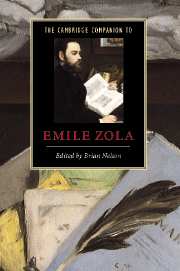Book contents
- Frontmatter
- 1 Zola and the nineteenth century
- 2 Family histories and family plots
- 3 Zola and the representation of society
- 4 Questions of sexuality and gender
- 5 Zola and contemporary painting
- 6 Zola and the art of fiction
- 7 Thérèse Raquin: animal passion and the brutality of reading
- 8 Nana: the world, the flesh and the devil
- 9 Germinal: the gathering storm
- 10 La Bête humaine: Zola and the poetics of the unconscious
- 11 Zola’s utopias
- 12 ‘J’accuse...!’: Zola and the Dreyfus Affair
- Further reading
- Index
2 - Family histories and family plots
Published online by Cambridge University Press: 28 May 2007
- Frontmatter
- 1 Zola and the nineteenth century
- 2 Family histories and family plots
- 3 Zola and the representation of society
- 4 Questions of sexuality and gender
- 5 Zola and contemporary painting
- 6 Zola and the art of fiction
- 7 Thérèse Raquin: animal passion and the brutality of reading
- 8 Nana: the world, the flesh and the devil
- 9 Germinal: the gathering storm
- 10 La Bête humaine: Zola and the poetics of the unconscious
- 11 Zola’s utopias
- 12 ‘J’accuse...!’: Zola and the Dreyfus Affair
- Further reading
- Index
Summary
Sexual and textual desire
It is a cliché to think of literary history in terms of family roles. The relationship of authors, particularly male ones, to previous generations of writers has often been understood in terms of Harold Bloom's famous notion of 'the anxiety of influence' and its explicitly Freudian model of Oedipal displacement. Indeed, it is hard to resist this model as one reads the private definition of Zola's Rougon-Macquart project, which he records under the title: 'Différences entre Balzac et moi' (RM v 1736-7). Ironically, this 'family romance' of literary identity depends on the primacy of Zola's fictional family: 'The scope [of my work] will be more restricted. I do not want to paint contemporary society, but a single family, by showing the play of race modified by milieu' ['Le cadre [de mon oeuvre] sera plus restreint. Je ne veux pas peindre la société contemporaine, mais une seule famille, en montrant le jeu de la race modifiée par les milieux']. Novelists and dramatists have often enjoyed a paternal relationship to the characters they have created, and Zola is by no means alone in his reference in correspondence to his novels as 'my children', though such paternal mastery itself risks displacement, or disfigurement, in the hands of deconstructive readings born in the wake of Roland Barthes' notion of the Death of the Author, which questions the pre-eminent status attributed to authorial intention in traditional literary criticism. But whereas Marcel Proust's insights, for instance, can be brought into historical focus by the contemporaneous achievements of psychoanalysis and modernism, Zola seems to belong to a more naive world in which personal identity and literary form appeared coherent.
- Type
- Chapter
- Information
- The Cambridge Companion to Zola , pp. 19 - 38Publisher: Cambridge University PressPrint publication year: 2007

